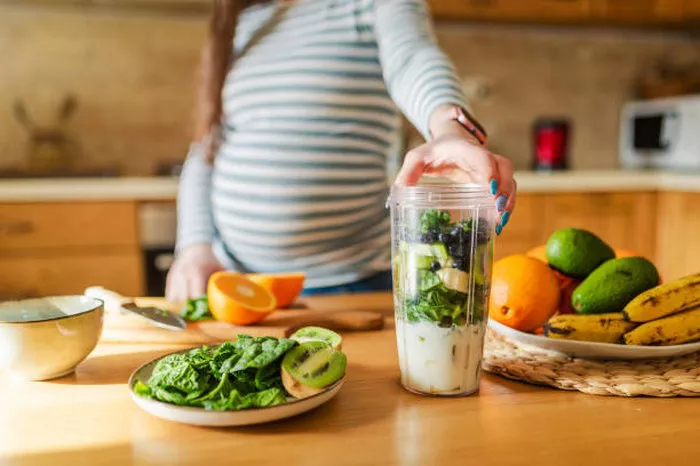High blood pressure during pregnancy, known as gestational hypertension or preeclampsia, can pose health risks to both the mother and baby. While it’s essential to follow medical advice, a well-balanced diet plays a key role in managing blood pressure. Certain foods are rich in nutrients that naturally support cardiovascular health, reduce inflammation, and help regulate blood pressure levels.
Here are 10 foods that can be especially beneficial for lowering blood pressure during pregnancy.
1. Leafy Green Vegetables
Spinach
Spinach is a powerhouse of nutrients, including potassium, magnesium, and folate—all of which support healthy blood pressure. Potassium helps balance out the negative effects of sodium, while magnesium relaxes blood vessels and improves circulation.
Kale
Kale is another excellent leafy green that provides calcium and fiber. Both nutrients are crucial during pregnancy for blood pressure control and fetal development.
Tip: Enjoy these vegetables in salads, smoothies, or steamed with olive oil for optimal absorption of fat-soluble vitamins.
2. Bananas
High in Potassium
Bananas are famously rich in potassium, which helps the body excrete excess sodium. This regulation supports better blood pressure levels.
Convenient Snack
They are also convenient, portable, and gentle on a queasy stomach—making them a favorite among pregnant women dealing with morning sickness.
Tip: Combine bananas with a handful of nuts for a balanced, heart-healthy snack.
3. Sweet Potatoes
Fiber and Potassium
Sweet potatoes are high in both fiber and potassium. The fiber aids digestion and promotes satiety, while potassium helps regulate fluid balance and lowers blood pressure.
Rich in Beta-Carotene
They are also rich in beta-carotene, which the body converts into vitamin A—important for fetal development.
Tip: Bake or mash sweet potatoes as a nutritious side dish or top with a dollop of plain Greek yogurt for extra calcium.
4. Berries
Blueberries and Strawberries
Berries contain antioxidants, especially anthocyanins, which help improve blood vessel function and reduce oxidative stress—a contributing factor in high blood pressure.
Vitamin C Content
They also provide vitamin C, supporting immune health and improving iron absorption from plant-based foods.
Tip: Add berries to oatmeal, yogurt, or eat as a snack to satisfy sweet cravings healthfully.
5. Oats
Natural Source of Beta-Glucan
Oats are rich in beta-glucan, a soluble fiber that has been shown to reduce both systolic and diastolic blood pressure.
Stabilizes Blood Sugar
They also help stabilize blood sugar levels, which is crucial during pregnancy when blood glucose levels can fluctuate.
Tip: Choose plain rolled or steel-cut oats over sugary instant varieties for the best benefits.
6. Low-Fat Dairy Products
Calcium for Blood Pressure Regulation
Low-fat milk, yogurt, and cheese are excellent sources of calcium, a key mineral that helps regulate vascular tone and blood pressure.
Probiotics for Gut Health
Yogurt also contains probiotics, which may contribute to improved metabolic health and lower blood pressure.
Tip: Aim for unsweetened dairy options and check labels for added sugars or artificial ingredients.
7. Avocados
Rich in Heart-Healthy Fats
Avocados contain monounsaturated fats, which support cardiovascular health by improving cholesterol levels and reducing inflammation.
Packed with Potassium
They are also one of the top sources of potassium—offering more than bananas in some cases.
Tip: Add avocado slices to toast, salads, or smoothies for a creamy texture and nutritional boost.
8. Salmon
Omega-3 Fatty Acids
Salmon is rich in omega-3 fatty acids like EPA and DHA, which help reduce blood pressure and support fetal brain development.
Anti-Inflammatory Benefits
These fatty acids also lower inflammation and improve blood vessel elasticity.
Tip: Choose wild-caught, low-mercury salmon and enjoy it baked, grilled, or added to pasta dishes. Aim for 1–2 servings per week during pregnancy.
9. Beets
Natural Nitrates
Beets contain nitrates, which the body converts into nitric oxide—a compound that relaxes and dilates blood vessels, improving blood flow and lowering blood pressure.
Rich in Folate
Beets are also high in folate, essential for preventing neural tube defects in the baby and supporting overall vascular health.
Tip: Drink beet juice in moderation or roast beets as a side dish for a naturally sweet flavor.
10. Lentils and Legumes
High in Magnesium and Fiber
Lentils, beans, and chickpeas are excellent sources of magnesium, potassium, and soluble fiber—all of which support lower blood pressure levels.
Protein-Rich
They also provide plant-based protein, which is essential during pregnancy for fetal growth and maternal health.
Tip: Use lentils in soups, stews, and salads to add bulk and nutrition to meals.
Additional Tips for Managing Blood Pressure in Pregnancy
Stay Hydrated
Drinking plenty of water helps maintain healthy blood volume and reduces the risk of swelling, a common concern in late pregnancy.
Reduce Sodium Intake
Avoid processed and salty foods, such as canned soups, chips, and fast food, which can contribute to water retention and elevated blood pressure.
Practice Portion Control
Eating smaller, more frequent meals throughout the day can help manage blood sugar and blood pressure levels more effectively.
When to See a Doctor
If you experience symptoms such as severe headaches, vision changes, swelling in the face or hands, or rapid weight gain, consult your healthcare provider. These may be signs of preeclampsia, which requires immediate medical attention.
Conclusion
Managing blood pressure during pregnancy is a delicate balance of nutrition, lifestyle, and medical care. Including these 10 nutrient-rich foods in your pregnancy diet can naturally support healthy blood pressure levels while providing essential nutrients for you and your baby.
Always consult your healthcare provider or a registered dietitian before making major changes to your diet during pregnancy. Nutrition plays a powerful role, but it should complement—not replace—medical guidance.
You Might Be Interested In:
- Barriers to Prenatal Care for Women with a History of Abortion
- Emotional and Psychological Aspects of Pregnancy After Abortion
- Fertility and Pregnancy Outcomes Following Abortion: New Research Findings

